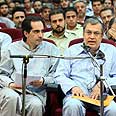
Iran probing rumored 'mass burial' of protesters
Reformist website claims dozens of people buried in unmarked graves after being killed over protests of Iran's disputed elections. Iranian parliament 'investigating' rumor
A member of a parliamentary committee looking into events after Iran's disputed election said on Tuesday the committee was investigating a rumored "mass burial" in a Tehran cemetery of protesters who had been killed.
The reformist website Norooz said last week that "tens" of people were buried in unnamed graves in the Behesht-e Zahra cemetery on July 12 and 15, about a month after the election, which sparked widespread street protests. Norooz did not identify those who were buried or say how they died.
YouTube video showing unmarked graves
"Parliament is investigating a rumor about a mass burial of post-vote detainees," the official IRNA news agency quoted MP Hamidreza Katouzian as saying.
"We cannot deny or confirm the case at the current time and if it is needed we will visit Behesht-e Zahra," Katouzian added, referring to Tehran's largest cemetery south of the capital.
He said the committee had contacted "relevant officials" who would provide a thorough report on the issue.
The losing candidates say 69 people were killed in the unrest that erupted after the June 12 election, which they say was rigged in favor of President Mahmoud Ahmadinejad.
Deepening divisions
Pro-reform cleric Mehdi Karoubi, who came fourth in the vote, has angered hardliners by saying some imprisoned protesters were raped in jail. He has also said some of those arrested were killed under torture.
The authorities, who have rejected Karoubi's accusations, have put the post-election death toll at 26.
Norooz, the news website of the leading reformist party Mosharekat, said in its report that "tens of unnamed and unknown people were buried in section 302 in Behesht-e Zahra."

'Show trial' of reformist opposition leaders in Iran (Photo: AP)
It said 28 burial permissions were issued without names on July 12 and 16 more three days later.
The poll and its turbulent aftermath have plunged Iran into its biggest internal crisis since the 1979 Islamic revolution and exposed deepening divisions within the ruling elite.
Thousands of people were arrested during widespread street unrest after the vote. At least 200 people remain in jail, including senior moderate politicians, activists, lawyers and journalists.
Seeking 'full punishment'
Iran held a fourth mass trial of leading post-election detainees on Tuesday. Analysts say the trials are aimed at uprooting the opposition and putting an end to protests.
The star defendant Tuesday was Saeed Hajjarian, who is considered the engineer of the pro-democracy reform program under former President Mohammad Khatami and is revered as a hero of the reform movement after he survived an assassination attempt in 2000. He was shot in the head from close range in the attack, leaving him partially paralyzed. He uses a walker and has difficulty speaking.
Two people helped Hajjarian into the courtroom, carrying him by the arms, the state news agency IRNA said. A prosecutor read out a long list of charges against him, among them, acting against national security, fomenting unrest, propagating against the ruling system, having contacts with British intelligence and insulting Supreme Leader Ayatollah Ali Khamenei.
The prosecutor asked for the "full punishment" against Hajjarian, though officials have not said what the maximum sentence would entail, and the dissolving of the pro-reform party to which he belongs, the Islamic Iran Participation Front.










